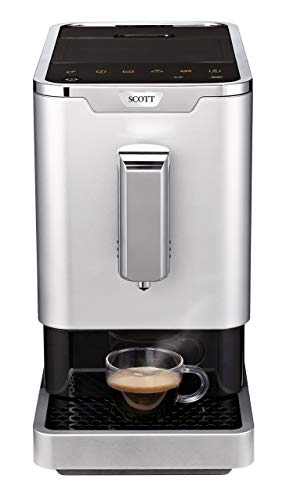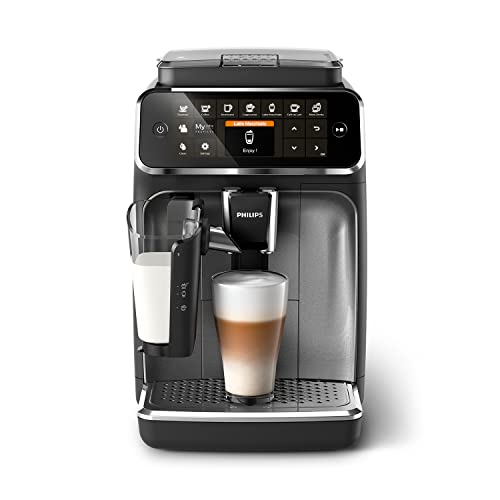What to Look For in a Commercial Espresso Machine
 There are many factors to consider when purchasing commercial espresso machines. The kind of espresso machine right for your cafe will depend on the quantity and purpose of use and barista skills.
There are many factors to consider when purchasing commercial espresso machines. The kind of espresso machine right for your cafe will depend on the quantity and purpose of use and barista skills.
Double boiler systems offer the ability to brew and steam simultaneously. It also reduces the time between pulls. Proportional-integral-derivative (PID) temperature control manages on/off cycles for optimal boiler temperatures.
Productivity
A commercial espresso machine can handle a larger volume of coffee than a home machine. A home espresso machine would not perform well in a professional setting.
A high quality commercial machine can serve up to 100 cups per hour in peak times. This is a huge benefit for busy workplaces, keeping employees from having to stand for Home espresso Machine a long time to get their coffee.
A coffee maker can help workers bond. Teams of workers often take turns getting coffee for one another, which can encourage collaboration and teamwork in the workplace. Having a dedicated space to enjoy coffee and espresso maker can assist new employees to feel at ease in the workplace, breaking down any barriers between them and senior staff members.
Commercial espresso machines come in a variety of sizes to accommodate different requirements. Some models are completely automatic while others are able to prepare espresso shots beforehand so that the operator does not have to guess the correct shot size. This is particularly crucial for companies with untrained baristas since incorrect shots can affect the quality and taste of espresso. In addition, it is recommended to purchase ethically sourced and manufactured commercial espresso machines which support the communities where coffee is produced. This will ensure a top quality product, and reduce the negative impact on the environment.
Safety
Espresso machines are massive heavy pieces of equipment that can cost the same as a brand new compact car. They're also designed to pump out hundreds of shots and drinks over the course of an entire day. Commercial espresso machines could pose unique health and safety risks for employees due to their high production.
Keep in mind that commercial espresso machines will likely to use warm water. This can encourage the growth of bacteria. A poorly maintained machine that isn't cleaned or descaled regularly can begin to accumulate spent espresso, which could turn rancid and could potentially cause illnesses if consumed by customers. A commercial espresso machine with steam wands that are not sealed may allow bacteria to thrive in the milk the frothing process.
When selecting a commercial espresso machine, it's important to consider the kind of drinks you plan on serving and the number of cups per hour your space can accommodate. You'll want to look for machines with automated features that will make it easier to serve your customers the best coffee drink. Additionally, look for a guarantee that covers parts and labor so that any technical issues can be solved quickly and efficiently.
Energy Efficiency
The power requirements of commercial espresso machines are substantially greater than home models. Professional espresso machines are heavier and have larger boilers in order to support multiple group heads in regular cafe production. They also operate at a greater temperature at ambient temperatures and are typically in an indoor location (such as the cafe or restaurant) where the electronics could overheat quickly, resulting in machine failure.
The boiler of a commercial espresso machine heats and stores pressurized water supplied by an electric pump. This water is then used to brew and steaming espresso. The boiler is comprised of several copper tubes that are heated by electric elements. When the brew sensor determines that the water level has reached the target level, the solenoid valve opens and the boiler is filled with fresh water. The heating element is then shut off.
There are four types of espresso machine sale machines, differentiated by their ability to steam and brew in the form of The TB (brewing only), TX (twin boilers) HX, TB, and DA (double automatic). TB and TX machines have stable brew temperatures, while DA offers rapid steaming using only one boiler. Many cafes are switching to HX machines, as they have been proven to provide the best espresso machine of both worlds in terms of brew and steam temperatures.
Maintenance
Just like cars need routine tune-ups, commercial espresso machines require regular maintenance to function smoothly and efficiently. If you keep your machine in good condition and you are able to enjoy a more flavorful coffee and will last longer.
It's a routine to clean your espresso machine, but you should be aware of those parts that require an extra clean. There are traces of coffee grounds and other milk products that could cause the machine to degrade over time. Regular cleaning can help prevent this from happening and helps keep your espresso machine running to its maximum.
Most commercial espresso machines require descaling every three months. This process requires a few extra steps compared to normal cleaning. It is recommended to review your manual to ensure you follow all the instructions. The solution used for descaling the tank in the water tank dissolves scale. You'll need a container to finish this task. In some models you may also require a container underneath the coffee spouts. Follow the instructions for your specific model.
A water filter change is another maintenance procedure. This is a step that can easily be forgotten, but it's important to keep in mind so you don't build up of mineral deposits. Check for calcification, which is difficult to get rid of, in the spray head.
 There are many factors to consider when purchasing commercial espresso machines. The kind of espresso machine right for your cafe will depend on the quantity and purpose of use and barista skills.
There are many factors to consider when purchasing commercial espresso machines. The kind of espresso machine right for your cafe will depend on the quantity and purpose of use and barista skills.Double boiler systems offer the ability to brew and steam simultaneously. It also reduces the time between pulls. Proportional-integral-derivative (PID) temperature control manages on/off cycles for optimal boiler temperatures.
Productivity
A commercial espresso machine can handle a larger volume of coffee than a home machine. A home espresso machine would not perform well in a professional setting.
A high quality commercial machine can serve up to 100 cups per hour in peak times. This is a huge benefit for busy workplaces, keeping employees from having to stand for Home espresso Machine a long time to get their coffee.
A coffee maker can help workers bond. Teams of workers often take turns getting coffee for one another, which can encourage collaboration and teamwork in the workplace. Having a dedicated space to enjoy coffee and espresso maker can assist new employees to feel at ease in the workplace, breaking down any barriers between them and senior staff members.
Commercial espresso machines come in a variety of sizes to accommodate different requirements. Some models are completely automatic while others are able to prepare espresso shots beforehand so that the operator does not have to guess the correct shot size. This is particularly crucial for companies with untrained baristas since incorrect shots can affect the quality and taste of espresso. In addition, it is recommended to purchase ethically sourced and manufactured commercial espresso machines which support the communities where coffee is produced. This will ensure a top quality product, and reduce the negative impact on the environment.
Safety
Espresso machines are massive heavy pieces of equipment that can cost the same as a brand new compact car. They're also designed to pump out hundreds of shots and drinks over the course of an entire day. Commercial espresso machines could pose unique health and safety risks for employees due to their high production.
Keep in mind that commercial espresso machines will likely to use warm water. This can encourage the growth of bacteria. A poorly maintained machine that isn't cleaned or descaled regularly can begin to accumulate spent espresso, which could turn rancid and could potentially cause illnesses if consumed by customers. A commercial espresso machine with steam wands that are not sealed may allow bacteria to thrive in the milk the frothing process.
When selecting a commercial espresso machine, it's important to consider the kind of drinks you plan on serving and the number of cups per hour your space can accommodate. You'll want to look for machines with automated features that will make it easier to serve your customers the best coffee drink. Additionally, look for a guarantee that covers parts and labor so that any technical issues can be solved quickly and efficiently.
Energy Efficiency
The power requirements of commercial espresso machines are substantially greater than home models. Professional espresso machines are heavier and have larger boilers in order to support multiple group heads in regular cafe production. They also operate at a greater temperature at ambient temperatures and are typically in an indoor location (such as the cafe or restaurant) where the electronics could overheat quickly, resulting in machine failure.
The boiler of a commercial espresso machine heats and stores pressurized water supplied by an electric pump. This water is then used to brew and steaming espresso. The boiler is comprised of several copper tubes that are heated by electric elements. When the brew sensor determines that the water level has reached the target level, the solenoid valve opens and the boiler is filled with fresh water. The heating element is then shut off.
There are four types of espresso machine sale machines, differentiated by their ability to steam and brew in the form of The TB (brewing only), TX (twin boilers) HX, TB, and DA (double automatic). TB and TX machines have stable brew temperatures, while DA offers rapid steaming using only one boiler. Many cafes are switching to HX machines, as they have been proven to provide the best espresso machine of both worlds in terms of brew and steam temperatures.
Maintenance
Just like cars need routine tune-ups, commercial espresso machines require regular maintenance to function smoothly and efficiently. If you keep your machine in good condition and you are able to enjoy a more flavorful coffee and will last longer.
It's a routine to clean your espresso machine, but you should be aware of those parts that require an extra clean. There are traces of coffee grounds and other milk products that could cause the machine to degrade over time. Regular cleaning can help prevent this from happening and helps keep your espresso machine running to its maximum.
Most commercial espresso machines require descaling every three months. This process requires a few extra steps compared to normal cleaning. It is recommended to review your manual to ensure you follow all the instructions. The solution used for descaling the tank in the water tank dissolves scale. You'll need a container to finish this task. In some models you may also require a container underneath the coffee spouts. Follow the instructions for your specific model.
A water filter change is another maintenance procedure. This is a step that can easily be forgotten, but it's important to keep in mind so you don't build up of mineral deposits. Check for calcification, which is difficult to get rid of, in the spray head.



